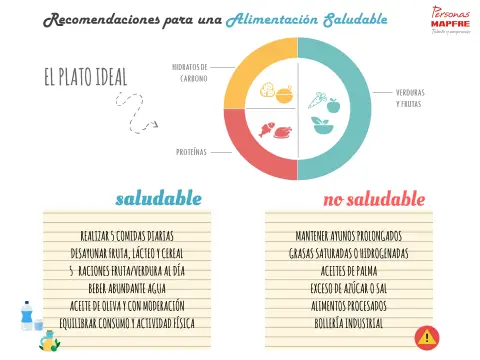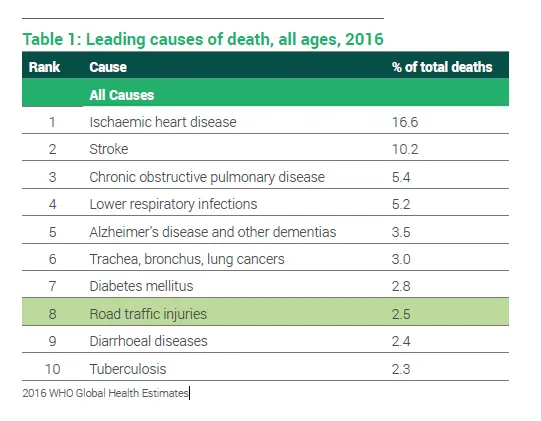HEALTH | 11.06.2020
Six healthy habits you can incorporate into your life from today
You don’t need to run marathons or have an organic chia-filled breakfast to have great health. You can improve your health by introducing some simple habits like long walks or more vegetables into your routine. Read on to learn about the habits that the World Health Organization recommends for a healthy lifestyle.
In recent decades, humankind has made incredible progress in the fight against some of the main factors contributing toward illness and death. This is reflected by the sustained increase in life expectancy in most countries. However, this progress has not been consistent between or even within countries, as warned by the World Health Organization, which reports that “There remains a 31-year discrepancy between the countries with the shortest and longest life expectancies.”
Furthermore, changes in lifestyles and diets, as well as urbanization, are all bringing to light new threats to people’s health. As highlighted by WHO, these include: “chronic respiratory diseases, diabetes, various types of cancer and road traffic injuries.” That’s why it’s important to review our habits to address these new threats.
Beyond illness
The WHO defines health as “a state of complete physical, mental and social well-being.” In this sense, health is no longer about the absence of illness, but rather a person’s overall well-being.
A healthy lifestyle should address at least the following areas:
- diet
- physical activity
- social activity
- relationship with the environment
Six healthy habits recommended by the WHO (and how to put them into practice)
From this perspective, the World Health Organization has been publishing various recommendations for a healthy lifestyle.

The first step: improve your diet
Across the world, unhealthy diets and lack of physical activity are among the main health risk factors. Hence the importance of reviewing our eating habits. WHO outlines the following guidelines for an adult who wants to maintain a balanced diet:
- At least 400 g (or five portions) of fruit and vegetables per day
- Less than 50 g of free sugars
- Less than 30 percent of daily calorie intake from fats
- Less than 5 g (about a teaspoon) of salt per day, which should be iodized
In summary, consuming more vegetables and less sugar, fat and salt is a great start to improving your health. To illustrate what a healthy plate includes, Harvard University has designed the Harvard Healthy Eating Plate, which you can use as a guide.
Or perhaps this infographic listing healthy eating habits and foods that are best avoided is more useful.

Avoid toxic habits (including alcohol)
Tobacco, alcohol and drugs have a very negative impact on health. Drinking alcohol at social gatherings is widespread in various countries worldwide. But this doesn’t mean it’s harmless. Alcohol consumption is associated with an increased risk of certain acute illnesses or being involved in a traffic accident.
Physical activity, at least 30 minutes a day
Health authorities recommend a minimum of 30 minutes of physical exercise a day as one of the main ways to develop a healthy life.
The benefits of exercise include burning excess calories, strengthening muscles and bones, controlling blood pressure, cholesterol and blood glucose levels, as well as helping to eliminate stress and improve sleep.
Maybe you’re thinking it’s hard to find the time to follow this recommendation. Well, the good news is that going for a fast walk also counts as an exercise. So walking instead of taking the car or public transport could be the solution to fix a sedentary life. It’s also becoming more and more common to see people wearing fitness trackers, since these represent an easy way of meeting minimum daily step goals.
Wash your hands, a practice that is here to stay
The COVID-19 pandemic has left no doubt as to the importance of hygiene as a protective measure. In recent months we have learned that an act as simple as washing your hands can save lives. In addition, maintaining good personal hygiene and keeping your home clean prevents dozens of health problems, from infections to skin problems.
Minimize exposure to toxic products
There isn’t necessarily always anything we can do about this, but exposure to toxic products can have a very negative effect on our health. So much so that, in a report on child health by the medical journal The Lancet and WHO, they warn that “the most developed countries are not the healthiest due to the impact of environmental pollution,” among other factors.
Even though more and more countries are taking action, the figure that “nine out of ten people around the world breathe polluted air” is troubling.
Stress management and other threats to mental health
In recent decades, mental health has been gaining prominence in the public debate. This covers both the promotion of well-being and the prevention of mental disorders, as well as the treatment and rehabilitation of those affected by them.
We recently talked about Mindfulness and other tools to manage stress and regulate emotions. Eva Rodríguez, a psychologist specialized in occupational health and Head of Diversity, Health and Well-Being at MAPFRE, explains: “people who regularly devote adequate time to practicing mindfulness achieve a greater degree of self-awareness and optimize emotional regulation, thereby reducing their stress and anxiety levels. They sleep better, have better memory and a greater ability to concentrate, their relationships and creativity improve, and ultimately, they change how they face the world.”

Quality time with the people who matter to us
When you think about looking after your health, a plate of vegetables or the weights room at the gym is likely to come to mind, but social and emotional relationships are also essential to our well-being.
However, fear of the spread of COVID-19 and its prevention measures have resulted in many people feeling isolated. In this regard, psychologist Laura Rojas-Marcos reminds us of the importance of “meeting up with family and friends again,” even if it’s with the help of new technologies and always while respecting protective measures. And above all, in the face of the obvious despair that many of us are experiencing, remember that “this is temporary, that life will not be this way forever.“
Pay attention behind the wheel
Distractions while driving (28 percent), alcohol consumption (24 percent) and speeding (23 percent) are some of the most common reasons why Spanish lives are lost on the road. Traffic accidents remain the eighth cause of death globally and the first for people between 5 and 29 years of age, claiming the lives of more than 1.35 million people in 2016.

If drivers respect speed limits, avoid alcohol, drugs or medications that can influence driving and don’t use cellphones, road accidents could be significantly reduced. However, a study carried out in the United States, New Zealand and Australia found that between 60 and 70 percent of drivers claimed to have used their phone at some point while driving.
If, in addition to looking after your health, you also want to support the sustainability of our planet, the answer lies in sustainable mobility that pursues the use of public transport, bikes or scooters. Numerous road safety tips can be found in our guide to safe, healthy and sustainable mobility.
Finally, it’s worth noting that the use of advanced driver assistance systems (ADAS) could help to prevent 50,000 incidents a year in Spain. Explore the advantages and limitations of these systems at this website.
